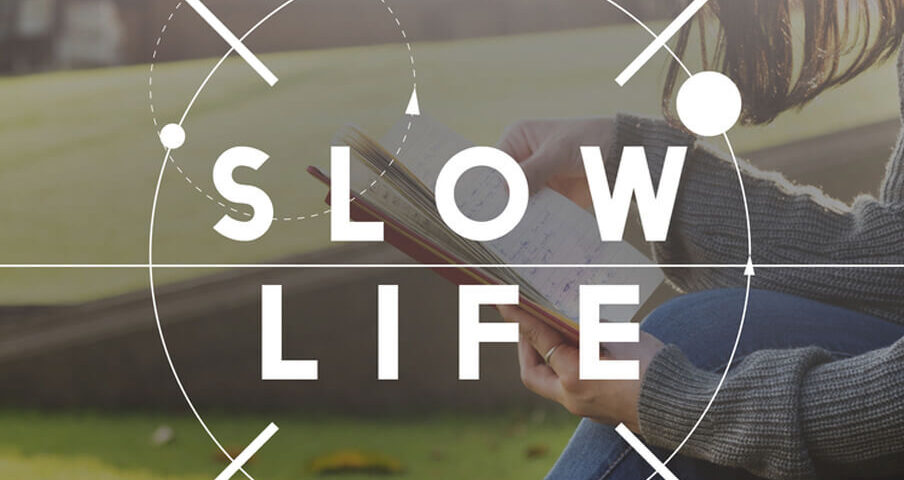
5 Steps to Improve Your Productivity and Achieve Your Goals
October 28, 2021
Psychology and Spirituality: Relationship, Differences, and Benefits
October 30, 2021A fast-paced life leads to automatism, stress, health problems, and the constant feeling of suffocation. Living slow makes us much calmer, helps us to relativize and prioritize what is truly important.
The philosophy of living slow has become my topic, not only on a professional and outreach level but also in my most personal sphere. I have found the term that defines how I want to live, and I am willing to continue researching and sharing everything about it.
That is why; I have to write about it as I feel this topic needs more light. Today I would like to share some of the benefits of adopting the philosophy of living slow as a way of life.
And, on many occasions, we have doubts about how to put certain concepts into practice, but we are also not clear about what results we can expect or what indicators we can look at to know if we are on the right track.
To clarify these points a bit, I have listed the benefits of living slower, how to go about it and what changes in your being you can expect.
What are the benefits of living slower?
Believe it or not, the first thing you will gain is time. Time for yourself, for reflection, to be with you, do your job well, give you a massage, read more, hug more, and eat better. And with that time that you gain, you also gain some other things that should be mentioned:
More happiness. When we slow down, we have more time to live calmly, pay more attention to what we do or experience, and see what we have better and with mindfulness. It isn’t easy to assess what one has, is, or has achieved in life if we always have our eyes set on the next task. With the philosophy of living slow, we can do it more easily, and with it, the feeling of gratitude springs up instantly. How can you not be happy when you can daily admire how lucky you are?
Less stress. A logical, almost automatic consequence of having more time. Imagine reducing the number of tasks you do throughout the day or the influx of thoughts that interrupt your activities. Don’t you have more time to get things done? Although five hours a day are not gained, the gain in time when adopting the slow life is easy to appreciate. Even the busiest person in the world can experience a kind of illusion about their time. It does not stop, it does not stretch, but it is lived differently.
Reducing, for example, the use of social networks in the morning can save us precious time to shower carefully, drink coffee carefully or go to work calmly and not running. Stress levels are lowered just with this little action of starting the day with your focus on world 1.0.
More health. If stress levels drop, we gain health. But not only that, we have said that we have saved time. Is this not an excellent opportunity to walk up the stairs, invest some time in eating better, or include 10 minutes of meditation in our routine? All this will improve our health and, if you carefully review your routines, you will surely find specific measures that you can adopt and that are beneficial in one way or another.
More fullness. This point is closely related to the first: more time, more attention, more experimenting and less suffering, more gratitude, more happiness, more fulfillment. Or the other way around, it doesn’t matter which comes first. Many of us pursue that feeling of fullness almost unconsciously. We want to experience that full chest, that connection, that “realization” that you are where you are because that is the way it should be and that everything is fine.
Adopting this philosophy leads us to create calm spaces, live more slowly, relativize, and prioritize what is really important. Living slow is a state of mind, no matter how your life is. If you do not find well-being, I am sure that you can do something to live it differently.
How can I start living slow?
Well, what is that something you can do? What are these changes to get us going? If you are familiar with my message, you will remember that I always talk about the investment of resources and that these resources are time, money, and energy.
When we think about what we can do, we must bear in mind that there is a wide range of possibilities and that my proposal is only a small part of an infinity of actions and strategies that we can follow. You can spend time learning about philosophy, practicing minimalism, or joining a school or group that talks about it all. Would you like to join our courses on NLP and mindfulness meditation?
Click here to check out our upcoming programs.
You can also analyze what budget you can allocate to improve your quality of life and start a course.
And, finally, you must be aware of the amount of energy that this is going to require. Help processes are often emotionally expensive, and cleaning and emptying the house is not energy-free either.
The key to living slow is attitude. That is the secret, the first point, the first measure to adopt. You can carry out all the actions you can think of, quit your job, go live on a beach, do yoga all day, whatever you want! If you do not accompany it with a relaxed attitude, there will be no change.
Now, knowing that attitude is the main thing. Let us look at things with which you can slow down and experience change.
Simplify your thoughts and your possessions:
When I talk about simplifying, I often mean life in general, thoughts, and the way we make decisions. But what about the things we have? Do you think they don’t make noise? Tell me, have you ever tried to simplify your routine? Decluttering your closet? Test it! You will not believe the peace you will achieve with it.
Also read: 10 Ways to Exercise and Improve Your Mind
Add and remove some things from your schedule:
Eliminate tasks, delegate, or get organized. What does your schedule need? We often complicate our schedules just because we have time for it: activities around the clock, going to the market several times a week, hours doing something that could actually be done in 30 minutes. But what can we really do with our schedule? We can remove tasks, put them together or try to repeat them as little as possible.
How many times do you cook a week? Every day? How many times are you going to make the purchase? Do you think you could organize yourself better? How long does it take to do each task at work? Could you be more efficient? Have you tried delegating? Many of us tend to put all the responsibilities we have and have on our shoulders. We like it; there is no more. But it weighs, weighs, and we don’t have to continue like this. Is there something you can delegate?
“I have too many things to do,” “I have no time,” “I work all the day” are some of the phrases that we repeat the most and on which I often reflect on social media. Why live like this? What leads us to brag about it? Has it become a necessity?
Read: Remove Clutter to Improve Your Productivity and Mental Health
Conscious and intuitive eating
The same advice is given in developing mindfulness, where you are advised to enjoy each bite of the food, and it cannot happen without slowing down.
The idea is that when we slow down, we begin to need to be present at mealtime. This presence makes it easier for us to recognize the signs of hunger and satiety, and, in addition, we begin to feel what we want and why we feel like it.
Read: 4 Keys to Practicing Mindfulness in Everyday Life
Balance between rest and activity
One of the most difficult balances to achieve. When we get active, we tend to want to do it all, we feel strong, we feel movement, and we want to do our best in the activities we enjoy.
However, this explosive motivation is as intense as it is short. We often burn out all our energy for the first few days or weeks. Then we feel exhausted, listless, and with the sensation of pulling a car that we cannot handle.
Can you remember something about which you were very excited, but the excitement faded away too fast?
I am talking about physical activity and sports, hobbies, leisure, entrepreneurship. The philosophy speaks of balance, and I am sure that you know which area of your life you need it the most.
What does living slow change in us?
Certain ways of being require you to slow down in life to practice them. Therefore, living slow opens up the possibility to the following ways of being:
Mindfulness
As I have mentioned earlier in this article, one of the benefits of living sow is that mindfulness becomes the basis of our experience. Therefore, emotions stop directing our lives, and we can move on to observe and regulate them. We have more patience (Hello moms!), and we live in the present, argue less, and remain happy.
It is work that we can, and must, do consciously at first. It is impossible to live mindfully without deciding to do it and repeat the daily actions until it becomes a new way of living.
When it has been integrated, and we notice the benefits, we can empathize with people who have not yet reached that point. Do you know why? Because we can recognize ourselves in their actions, we see how much our life has changed with the practice of this philosophy.
Read: Mindfulness Training: Nourish Your Life
Assertiveness
Assertiveness is a form of communication in which the individual is respected without falling in terms of aggressiveness.
This term is often used in business settings because we realize that meetings are ineffective, and agreements are not reached without respectful, firm, fluid, and prepared communication.
Now imagine communicating better with your partner, your parents, your children, your co-workers and, of course, with yourself too!
Imagine asking yourself exactly the things you need and imagine taking responsibility for your actions without falling into blame or blame.
Assertiveness involves learning to say no, set limits, and respect our needs. It is a job and a logical consequence of slow life.
Spirituality
This is one of my favorite benefits of slow life and, of course, one of the measures I propose to people who ask me how to adopt this philosophy of life.
Depending on the concept that we have of spirituality, the relationship of spirituality with the philosophy of living slow can be less or more. Still, it is something that goes hand in hand with me. For many people, it is not like that.
From my point of view, the philosophy of living slow is necessary for anyone who wants to nurture their spirituality. Due to the rhythm of life we lead, we should either stop or become silent; otherwise, there is no way to connect.
Gratitude
The philosophy of living slow will help you feel gratitude. At first, it will be work that you will do consciously. Every day, at some point, you will want to think about everything that happened in the day and give heartfelt thanks for what happens to you and what did not happen to you.
However, with time it will be a sensation that will come alone as long as you are silent or manage to connect with that divine energy that we are.
You will be surprised thinking how lucky you are while you see a landscape, watch your children sleep or water your plants. And this feeling will invite you to slow down further, open more spaces for connection and be more aware of how lucky you are.
This is how spirituality feeds slow life, and slow life makes spirituality possible.


